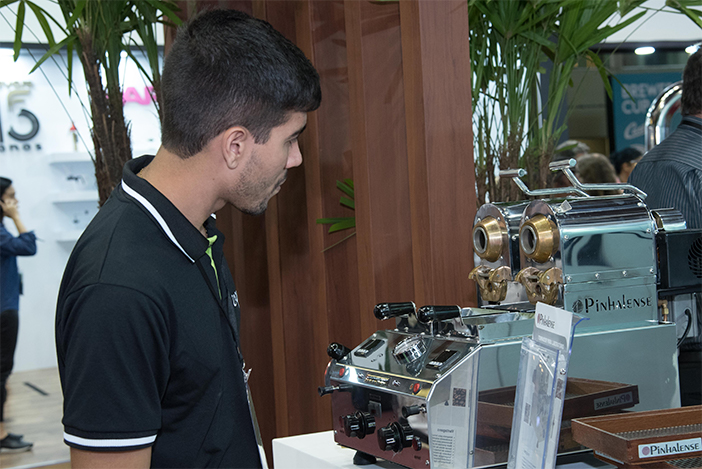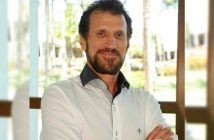This is what urges the CEO of Pinhalense, Reymar de Andrade, who has been working around partner farms around the world to develop fermentation processes
Grão Especial: What is missing for Brazilian specialty coffees to gain greater recognition from the international market?
Reymar de Andrade: some say that Brazil is coming late in this market, but I do not agree with that. I would say the country is being discovered by the world of specialty coffees. The concept of specialty coffees came from the standardization of beverage and consumer expectation from markets other than Brazil. The great misconception and obstacle to our specialty coffees is to expect that coffees produced in Brazil will have the same characteristics as those produced in Ethiopia, Colombia, etc.
I like to compare them with wines, which I love! One desires wines. The history of Malbec is exemplary in this sense. The world only wanted and valued the strains produced in France, until the Catena family in Argentina did an exquisite work with Malbec, which was once considered a poor quality grape in France and much used only to make wines, rarely using more than 5%of it in their wines. Nowadays, everyone knows that the good Malbec is Argentinian, period. That means no one compares a Semillion Blanc with Malbec or Cabernet Sauvignon. There are times when you wish to drink a Malbec, other times a Cabernet.

Reymar de Andrade
And that’s the way it has to be with specialty coffees. Varieties, regions and types of processes influence the quality of coffee. And Brazilians are as good as or even better than those in some of the world’s coffee producing regions.
One cannot compare Brazilian coffee to Ethiopian or Guatemalan coffee.
Grão Especial: is it easy to innovate in the specialty coffee market?
Reymar de Andrade: Not really! Pinhalense developed the peeled cherry process years ago and, at first, was challenged as an aberration of the quality process, since specialty coffee in Brazil had to be natural cherry, at least that was what the international market advocated. Those peeled and stripped could only come from Colombia. Now, this is the DNA of our work: knowing the potential of transforming characteristics, encouraging technological transference. Anyway, it worked very well and today the peeled cherry method is consecrated in the universe of specialty coffees.
Grão Especial: the mechanization in the production of specialty coffees is a no-return way?
Reymar de Andrade: Definitely! We are continuously developing new technologies, always with the support of institutions such as Embrapa, universities, among others, because we believe in the transformation of the market, to allow the production of specialty coffees to be mechanized. We have to understand that the production has to be dedicated to the farm as a whole, not only to microlots. The account has to be fit. And, currently, in Brazil, this account can only be fit if the production is mechanized due to the extremely high costs of labor. Now, the international market for specialty coffees still sees mechanization as a preconception. But, let’s just look at Colombia for a minute, for instance. Formerly, its fine coffees were manually harvested from seven to eight times a year. With the rising production costs, they have reduced it to six to five times. Currently, some farms are only harvesting three or four times a year. Why? Because the pressure of production cost on the chain is huge! In my opinion, the Brazilian coffee chain is the one that transfers value the most in the world, which international buyers have already noticed. And the rest of Latin America is the one that transfers value least, from the cups to producers.

Pinhalense
Grão Especial: back to the innovation theme, what is the big issue of the moment in terms of producing specialty coffees?
Reymar de Andrade: the fermentation processes. It is still a restricted market, small producers, but it is a market that interests us. In a template farm in El Salvador, our partner, we are developing a fermentation tank coupled with an unpulping system. We have the fermentation tank as an integral part of the equipment within the process.
We have chosen El Salvador because the producers there are more advanced, more linear, and they already know what they want. Here in Brazil, a wilder process is still happening and these producers will not come to us. And at this point, producers are not sure about what they need, what they should do. However, we have partners with leading producers of Carmo de Minas and we are contributing with them in the creation of a system. Now, the important thing is that we are in the vanguard and able to encourage it to happen here as well, since we have validated new equipment in several places of the world at the same time.
We will follow it up for a couple of more harvests before consolidating a fermentation production line.
Grão Especial: how can the consolidated fermentation process help the Brazilian specialty coffees market?
Reymar de Andrade: we believe that the fermented ones will promote a revolution in the sensorial profile of Brazilian specialty coffees. Once the processes are consolidated and we have more defined profiles of fermentation, we will try extraordinary beverages that other countries will not be able to produce.
Grão Especial: what was the turnover like in 2018?
Reymar de Andrade: the estimate is that we end the year with a turnover of R$ 180 million, namely a growth of 10% over last year. Our result was governed by a large Brazilian crop and, consequently, by a greater demand in equipment. Unfortunately, there have been times of the harvest in which we have turned down numerous requests. Another factor that allowed us to move away from the crisis was that we developed and launched new products. The most important thing was the new unpulper, and a new line of static drying.
Another strand of growth in 2018 in Brazil was the investment in microlot quality and new benefits. The demand for coffee preparation and marketing has changed. Exporters had to structure themselves better and make investments from their warehouses, because they have more demanding customers. They had to adapt the processing plants and the small lots are issues to be dealt with within these plants. Inside their plant, they have a small line to work their microlots. Microlot plants from department stores positively impacted our bottom line. We also launched new products, a new unpulper and the producers exchanged their unpulpers.
Grão Especial: Plans for 2019?
Reymar de Andrade: In terms of turnover, we will have a very similar result compared to 2018. The 2019 harvest will not be so good. But we are going to launch several devices, among them, floor machines, one of conillon harvest and another one for the arabica line, already in January.
Fotos e vídeos: Clodoir de Oliveira



